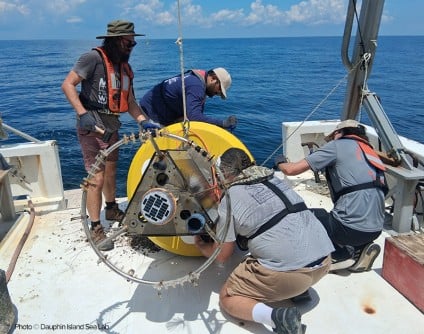Science
GCOOS Seeks Project Ideas for 2026 IOOS Proposal Submission

The Gulf of America Coastal Ocean Observing System (GCOOS) has announced a call for Letters of Intent (LOIs) as it prepares its five-year proposal for the National Oceanic and Atmospheric Administration’s (NOAA) Integrated Ocean Observing System (IOOS). This proposal will cover the funding period from July 2026 to June 2031. GCOOS is inviting project ideas from its members and stakeholders located throughout the Gulf region.
Based at Texas A&M University, GCOOS is one of eleven regional observing networks operating under the IOOS initiative in the United States. The organization plays a critical role in gathering and disseminating data related to marine environments, similar to how the National Weather Service provides weather forecasts. GCOOS has been instrumental for over twenty years in delivering reliable information regarding the Gulf’s coastal and open-ocean waters, benefiting ecosystems, local communities, and the economy.
GCOOS aims to enhance its network of business leaders, marine scientists, resource managers, and various stakeholders to ensure that vital data reaches those who depend on it. The organization is actively seeking innovative project proposals that could come from public, private, academic, or nonprofit sectors for inclusion in its coordinated proposal.
Although NOAA has not yet released the official funding opportunity, GCOOS is proactively moving forward with the proposal preparation. Selected projects will help advance GCOOS’s Strategic Plan for 2020-2025 and the Addendum to the Build-out Plan, both of which are designed to strengthen the ocean observing network throughout the Gulf.
Key Dates and Submission Guidelines
Each LOI submitted will undergo a formal review process to assess its fit for integration into the comprehensive proposal. Teams whose projects are selected will receive notification and will have ample time to prepare the necessary official documentation. This includes an approved budget, the SF424A budget form, budget justification, and letters of support, all submitted through their institutional offices following NOAA’s formal announcement.
It is essential that all submissions adhere to the specified LOI requirements. Incomplete or non-compliant submissions will not be considered for inclusion in the GCOOS IOOS proposal. The timeline for the submission process is as follows:
– **LOI Submission Deadline**: 5 p.m. CT on October 17, 2025
– **Informational Webinar and Q&A**: Mid-September (date to be determined)
– **LOI Review Period**: October 20–31, 2025
– **Notification of Inclusion in Full Proposal**: November 1, 2025
– **Completion of Subaward Package Deadline**: November 30, 2025
– **Anticipated GCOOS Proposal Submission to NOAA**: December 31, 2025
– **Anticipated Project Start Date**: July 1, 2026
GCOOS is particularly interested in projects that align with its Strategic Plan and emphasize observing platforms, sensors, modeling, and education and outreach. For further details on the LOI submission process and requirements, stakeholders can access additional information through GCOOS’s official channels.
The initiative exemplifies GCOOS’s commitment to fostering collaboration among diverse stakeholders while enhancing the understanding and stewardship of the Gulf of America’s marine environments.
-

 Science1 month ago
Science1 month agoNostradamus’ 2026 Predictions: Star Death and Dark Events Loom
-

 Technology2 months ago
Technology2 months agoOpenAI to Implement Age Verification for ChatGPT by December 2025
-

 Technology7 months ago
Technology7 months agoDiscover the Top 10 Calorie Counting Apps of 2025
-

 Health5 months ago
Health5 months agoBella Hadid Shares Health Update After Treatment for Lyme Disease
-

 Health5 months ago
Health5 months agoAnalysts Project Stronger Growth for Apple’s iPhone 17 Lineup
-

 Technology5 months ago
Technology5 months agoElectric Moto Influencer Surronster Arrested in Tijuana
-

 Science2 months ago
Science2 months agoBreakthroughs and Challenges Await Science in 2026
-

 Education5 months ago
Education5 months agoHarvard Secures Court Victory Over Federal Funding Cuts
-

 Health5 months ago
Health5 months agoErin Bates Shares Recovery Update Following Sepsis Complications
-

 Science4 months ago
Science4 months agoStarship V3 Set for 2026 Launch After Successful Final Test of Version 2
-

 Technology7 months ago
Technology7 months agoMeta Initiates $60B AI Data Center Expansion, Starting in Ohio
-

 Technology6 months ago
Technology6 months agoDiscover How to Reverse Image Search Using ChatGPT Effortlessly





















